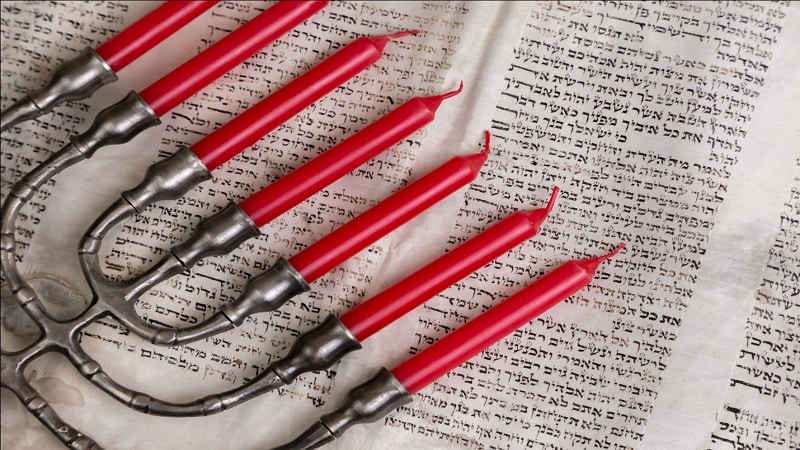Every year, thousands of Jewish individuals worldwide celebrate Hanukkah on the 25th day of the month of Kislev on the Jewish calendar. The holiday involves week-long celebrations as the Jewish rejoice in the victory God brought to them after they had faced severe oppression.
Since it is such an auspicious and one of the most prominent celebrations by the Jews that often takes place around Christmas, the question arises, why don’t Christians celebrate Hanukkah?

There are several reasons why Christians don’t celebrate Hanukkah, but the primary one is because it is not part of their religious duty to do so. Since it is not obligatory by religious law for Christians to celebrate this holiday, many choose not to. However, regardless, there is still mention of this Holiday in the Bible, and even Jesus has celebrated Hanukkah with the Jews.
This blog will give you a thorough overview of what Hanukkah is, why Christians don’t celebrate it, and if Christians ever did partake in Hanukkah celebrations in history.
What is Hanukkah?

Hanukkah is an eight-day celebration by the Jewish to celebrate the recovery of Jerusalem and the victory brought to them by God about 2,500 years ago when they rebelled against the oppressors. The celebrations start on the 25th of the Jewish month of Kislev and begin at sundown. They last for eight days and are concluded on the eighth day during sundown.
The menorah in the Temple of Jerusalem was running out of oil and had only enough oil left that could last a day. However, this amount of oil miraculously lasted for about eight days and kept the lamp burning till then. The Jews thus celebrate this miracle of the oil during Hanukkah.
Therefore, Hanukkah is also known as the ‘Festival of Lights’ or the ‘Feast of Rededication.’ This is mainly because the holiday celebrates the lighting of the menorah lampstand and the rededication of the Jewish temple.
History of Hanukkah
During the reign of Alexander the Great in the 2nd Century BCE, all individuals could practice their own religion comfortably under his ruling. However, several years later, there was a new leader of the land, Antiochus IV Epiphanes. This man was cruel and despised the Jews, which is why he oppressed them, massacred them, and did not let them pray or practice their religion in the Jewish temple on their own terms.
As a result, a rebellion group of Jews was formed and led by Mattathias Maccabee and his son, Judah Maccabee. They fought all foreign armies and gained victory and independence from the land of Jerusalem. After this, they purified the temple to what it used to be like previously.
However, when it was time to relight the menorah lampstand, there was insufficient purified oil to keep it burning for longer than a day. Yet, this small jar of oil kept the lamp burning for nearly eight days. And so, the Jews observe Hanukkah as a way of rejoicing in their victory and God’s provision of the oil.
Hanukkah in the Bible
Though there is not an abundance of Jewish religious significance of this holiday, since it is a big celebration that typically takes place in the months of November or December, the holiday is considered to be the Jewish version of Christmas.
There are also several similarities between Hanukkah and Christmas because both involve putting up lights and decorations and the tradition of gift-giving. However, surprisingly, it should be noted that Jesus celebrated Hanukkah, and there is mention of this holiday in the Bible as well.
For example, John 10:22-23 says:
“Now it was the Feast of Dedication in Jerusalem, and it was winter. And Jesus walked in the temple, in Solomon’s porch.”

At the time, Hanukkah was called the Feast of Dedication. It was during this holiday that Jesus spoke to the crowd and informed them of his messianic identity. Here, he announced that He and God were one, and so, He was God. However, the Jews believed that he was being blasphemous and so threw stones at him. Luckily, Jesus escaped from them.
Christians Celebrating Hanukkah
There is no religious requirement or Christians to celebrate Hanukkah. However, the Bible records Jesus visiting and partaking in the celebrations of the Feast of Dedication. Therefore, it shows that celebrating Hanukkah is not unbiblical, and Christians should not reject it. While Christians don’t need to observe this holiday, they can indeed partake in the celebrations if they want to.
Similarly, Hanukkah is not entirely a religious and biblical holiday for the Jews. It is simply celebrating God’s provision of Israel. Hence, Christians can celebrate Hanukkah with the Jews to appreciate God’s provision. However, they are not required to follow each Jewish tradition in Hanukkah.
Furthermore, Christians can look at Hanukkah as a reminder that God is always watching over them. Additionally, as a reminder that we should always celebrate the protection that God bestows upon those who believe in Him. Other lessons we can take note of from the Feast of Dedication and celebrate are that God gives victory to those who remain steadfast and dedicated towards Him and His worship. He hears our cries and pleads and helps us when we need Him most.
Hence, Hanukkah serves as a reminder of the protection He has over all of His believers, including Christians and Jews.
Our Final Thoughts
At the end of the day, the essential aspect of Hanukkah is celebrating the protection God has over His believers. Therefore, those who are not Jewish are free to partake in the Hanukkah celebrations since it is not biblical to do so. The holiday is simply a remembrance and commemoration of God’s provision of Israel and is not entirely a religious holiday.
That said, Christians are not obligated to partake in Hanukkah since they are not under Jewish law. But if they wish to, they certainly can.












